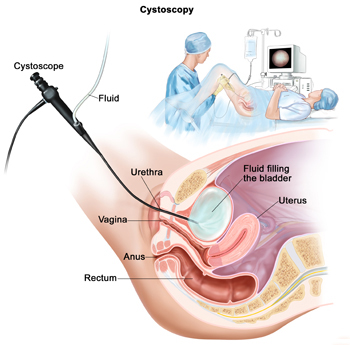Interstitial Cystitis
Interstitial cystitis also called painful bladder syndrome is a chronic condition causing bladder pressure, bladder pain and sometimes pelvic pain. The pain ranges from mild discomfort to severe. Interstitial cystitis — also called painful bladder syndrome is a chronic condition causing bladder pressure, bladder pain and sometimes pelvic pain. The pain ranges from mild discomfort to severe.
Your bladder is a hollow, muscular organ that stores urine. The bladder expands until it’s full and then signals your brain that it’s time to urinate, communicating through the pelvic nerves. This creates the urge to urinate for most people.
Your bladder is a hollow, muscular organ that stores urine. The bladder expands until it’s full and then signals your brain that it’s time to urinate, communicating through the pelvic nerves. This creates the urge to urinate for most people.
With interstitial cystitis, these signals get mixed up you feel the need to urinate more often and with smaller volumes of urine than most people.

Causes
The exact cause of interstitial cystitis isn’t known, but it’s likely that many factors contribute. For instance, people with interstitial cystitis may also have a defect in the protective lining (epithelium) of the bladder. A leak in the epithelium may allow toxic substances in urine to irritate your bladder wall.
Other possible but unproven contributing factors include an autoimmune reaction, heredity, infection or allergy.
Symptoms
- Pain in your pelvis or between the vagina and anus in women
- Pain between the scrotum and anus in men (perineum)
- Chronic pelvic pain
- Frequent urination, often of small amounts, throughout the day and night (up to 60 times a day)
- Pain or discomfort while the bladder fills and relief after urinating.
- A persistent, urgent need to urinate
- Pain during sexual intercourse.
FAQs
WHAT IS UROLOGY?
Urology is a surgical speciality that addresses male and female diseases of the urinary tract, as well as male reproductive system disorders. Urology is a part of health care that deals with diseases of the male and female urinary tract (kidneys, ureters, bladder and urethra). It also deals with the male organs that are able to make babies (penis, testes, scrotum, prostate, etc.). Since health problems in these body parts can happen to everyone, urologic health is important.
WHAT CAN I DO TO MAINTAIN GOOD UROLOGIC HEALTH ?
The best way to avoid urological problems is to maintain good overall health habits, including exercising regularly, maintaining a healthy weight and avoiding tobacco, excessive alcohol, and caffeine.You should also avoid foods or substances that remove water from the body, known as diuretics.
THERE’S BLOOD IN MY URINE. WHAT MAY BE THE CAUSE?
The presence of blood in the urine could be the result of a minor cause or a serious underlying medical condition. To determine the source, a urologist will perform a thorough evaluation. The blood could be the result of an infection, kidney or bladder stones, cancer of the urinary system, or injury.
IT’S PAINFUL TO URINATE. WHAT COULD BE CAUSING THE PROBLEM?
There are many conditions that could result in painful urination. An infection of the urinary tract or prostate is a common cause, along with obstructions in the urethra, kidney, bladder, or prostate.